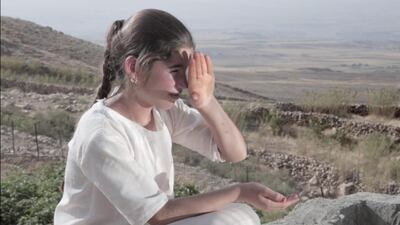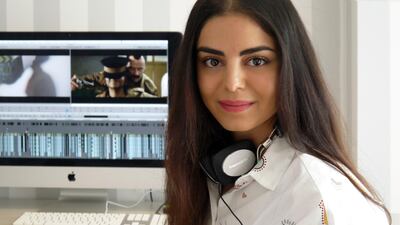Decades of war and conflict have taken a hefty toll on Iraq’s cultural sector, leaving aspiring filmmakers with little opportunity to showcase their work to the world.
But both emerging and established creatives will get to show their best creations during the inaugural independent Iraqi Film Festival, which will be digital this year, and begins on Friday, August 21.
The festival aims to reverse the hardship that aspiring Iraqi filmmakers, both in and out of the country, have endured over the years. It was established by a team of four Iraqi creatives: film editor Shahnaz Dulaimy, Roisin Tapponi, an Iraqi-Irish writer and founder of Habibi Collective, poet Israa Al Kamali, and Ahmed Habib, who works at digital magazine Shakomako.
Its main goal is to revive the country's dwindling cinema scene, which was left in shambles due to not only war, but also government negligence. "We wanted to give Iraqis the chance to connect and feel proud of their cultural heritage," Dulaimy tells The National.
The festival aims to shore support for young Iraqi filmmakers “because knowing that there is an audience for it will only encourage artists to come out and tell their stories,” she says.
This is what is “lacking in Iraq right now, not just for Iraqis in Iraq but for those in the diaspora too,” she points out.
Dulaimy, editor of Oscar-nominated Theeb (2014), believes the highlight of the festival will be the shorts programme and the not-so-well-known films created by first-time producers.
"We got more than 80 submissions, mostly from inside Iraq and this is important to us because it is the heart and soul of the festival," Dulaimy says, adding that 13 movies will be shown across a week between Friday, August 21 to Friday, August 28. Read more about some of the films here.
The festival will open with Mohammed Al Daradji's documentary, War, Love, God & Madness (2008), which portrays the challenges of filmmaking in Iraq. Many filmmakers pour blood, sweats and tears into their works, and this is shown in Al Daradji's documentary.
“At one point he gets kidnapped during the shoot and that is represented in his documentary. He has gone through a lot after that, he had to undergo surgery because the kidnappers broke his legs,” Dulaimy says.
Shooting a film in Iraq is an uphill battle, she points out. “It’s harsh, it's extreme, it’s not easy for filmmakers to put their lives out there.”
Independent film producers in Iraq have struggled on their own over the years, with little or no government funding, which is often needed to provide a jumpstart in the industry.
“By spotlighting these films, the festival will create a network that introduces audiences to filmmakers so they can get support, not just to show their films, but also by getting financial support for their future projects,” Dulaimy tells us.
This will empower not only filmmakers, but also actors, screenwriters, designers and sound artists, showcasing Iraq’s talent and diversity. “We wanted to make sure that Iraqis all over the world are given fair representation on the (film) platform,” Dulaimy says.
Iraqi cinema dates back to the 1950s, although production did not exceed more than a few films a year, even then. The government’s cinema department was established in 1959 but produced only two feature-length films in the next decade, along with a handful of documentaries.
But right now it does not really exist, Dulaimy points out. Creating a new identity for people in the same way other countries in the region have done with their films is what Dulaimy hopes the festival will do.
“It’s vital for us to support these films to give them recognition. It's not easy to shoot so we must make it worthwhile for people to see them."
She explains that an audience can identify an Iranian movie just by watching the first 10 seconds of it, without any dialogue, and she hopes Iraqi cinema will soon be so identifiable.
She says the country's cinema style is "very raw" but that this works because it "is original and genuinely representative of an Iraqi identity.”
For more information about the festival programme, visit iiffestival.com



